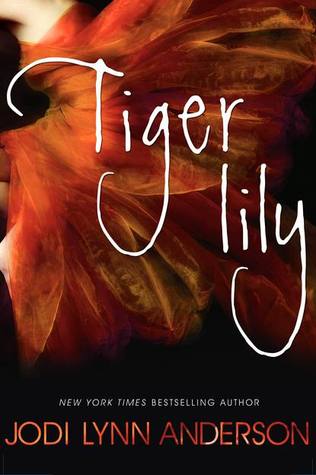
Tiger Lily
by Jodi Lynn Anderson
“I'm not myself," she offered, guiltily. She softened around Tik Tok, and when she did she was, for those rare moments, girlish.Tiger Lily lives in Neverland, an island in the Atlantic where ships of Englanders occasionally wash up with pirates or children or folks who don't last very long. Englanders have a disease that makes them continue to grow older until they die, something the natives are not subject to. Tiger Lily is an orphan, adopted by the shaman of the tribe, a man named Tik Tok, who is "of two genders": he is a man who wears women's clothing. Tiger Lily lives up to her name: fierce, stoic, and unreadable except by those who know her well. She is a misfit in the tribe, so when she meets Peter Pan, the ominous and deadly boy in the woods, she is caught up in a world where she is needed, special, admired. Her relationship with Peter ignites with heart-thrumming intimacy. But when Tiger Lily neglects her tribe to tragic results, and when a Wendy bird arrives, will they be able to maintain their connection, or will Tiger Lily lose everything?
He smiled. "You can never say that. You're just a piece of yourself right now that you don't like.”
This was such a fascinating book. It is narrated by Tinkerbell (not her real name, simply a name Peter condescendingly bestowed). She cannot speak, but she can sense the thoughts and feelings of those around her, making her a unique, slightly omnipotent storyteller. Neverland itself is a strange entity. It is set in our world. Their are fairies and mermaids, but no flying, no "second star to the right." And yet, Anderson manages to maintain what I loved most about the original story: the very real psychology of the characters.
This story also maintains the ache of the original. As an adult reader, you know what things mean. The larger implications of certain feelings become clear. You pity, envy, and are frightened of Peter. He becomes that boy. The one who cannot understand the feelings he is having. The one who shuts himself to any other reality but his own. The one who desperately means to keep promises, but then does not. The one who sends you to the highest highs but also deeply frightens you with what he is capable of. I understood Peter more in this book than in any other interpretation. Hook's desperation for Peter is not the comical Disney or musical version: it is dark and dangerous and self-destructive. Smee is still "lovable" but you remember why he is a pirate and not an affable accountant. He is still a murderer. Wendy is much stronger and also much weaker than in the original. She is so sure of herself because the world cannot be other than how she sees it. The lost boys are not romanticized as off on a camping trip. These boys act the way any children would if they were left to their own devices, forced to survive on their own. They hero-worship Peter, desperate to have some sort of direction, a compass to focus their days. But this, of course, takes a toll on a leader who is still very much a boy himself.
Tiger Lily is wonderfully complex and refreshing. She is not a preteen seductress, nor a silent generic "indian." She is guarded and pained and untrusting but also worthy and strong, and has the capacity for deep love. And she does not, as this book seemed to imply at the beginning, loose her mind, heart and need for life when she loses Peter (as all girls lose Peter).
The cast of new characters are more of a mystery to us, but they are no less compelling: Pine Sap, Tiger Lily's mishapen and introspective friend, and Tik Tok the shaman whose slow tragedy breaks our hearts.
This is a quality Peter Pan adaptation. Well-written and faithful to the spirit of the original.
